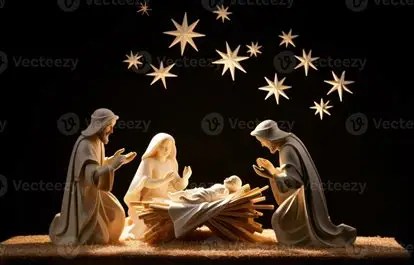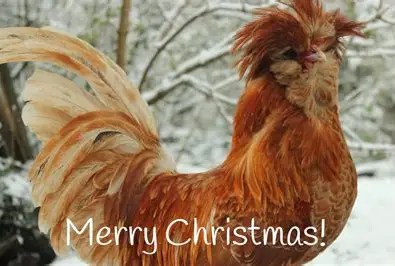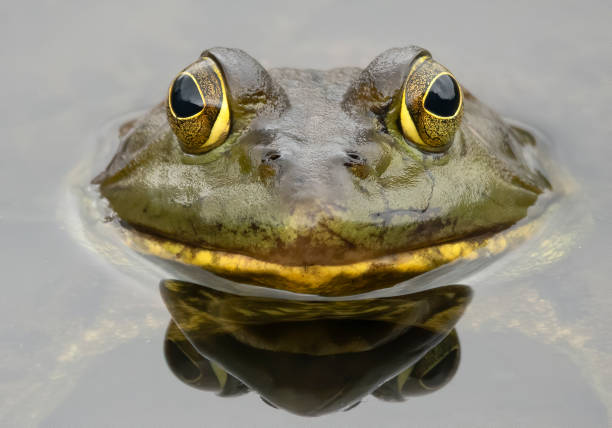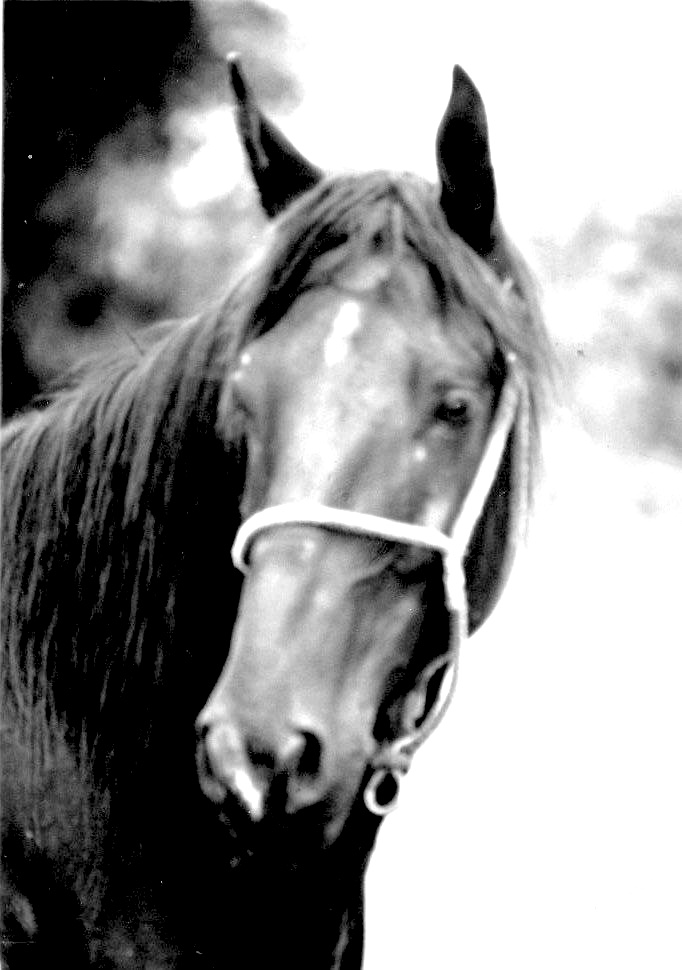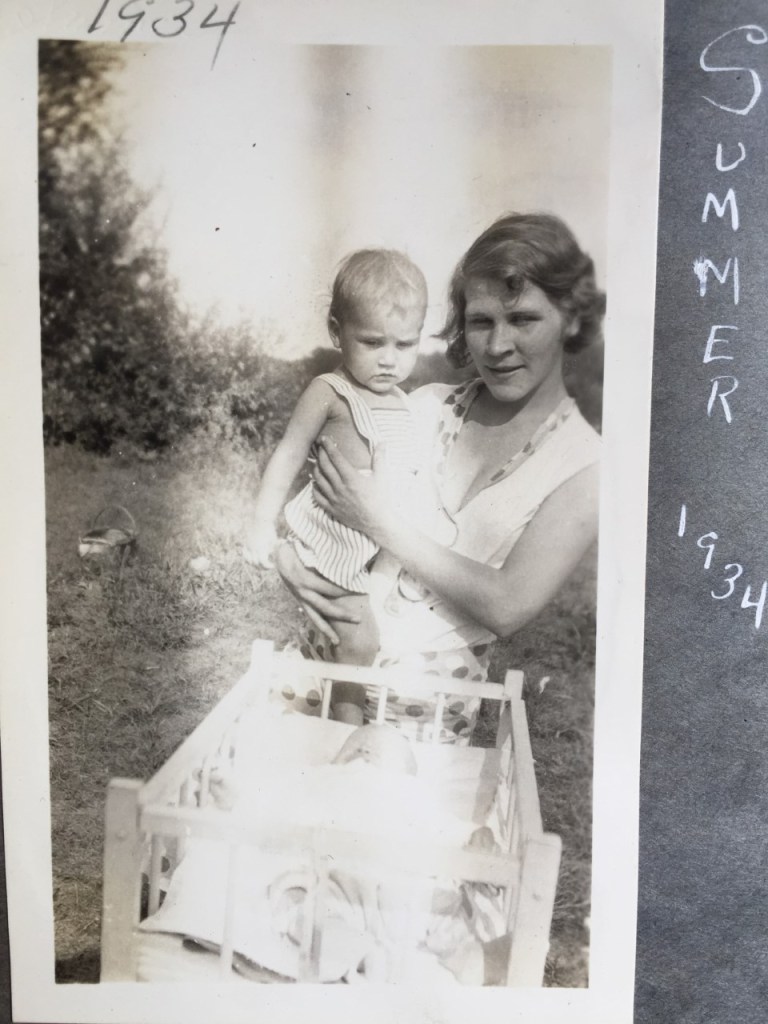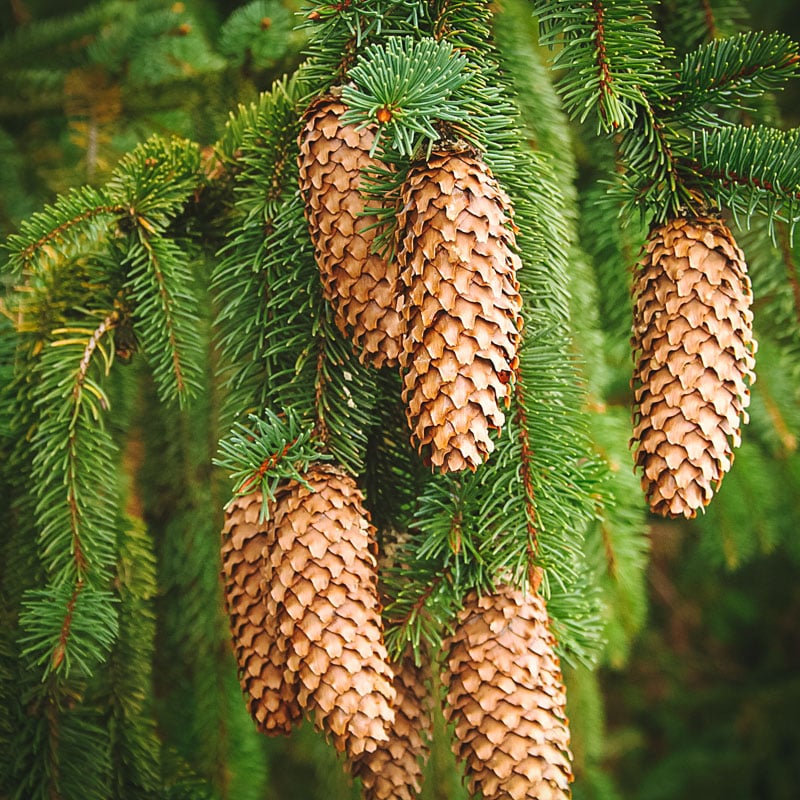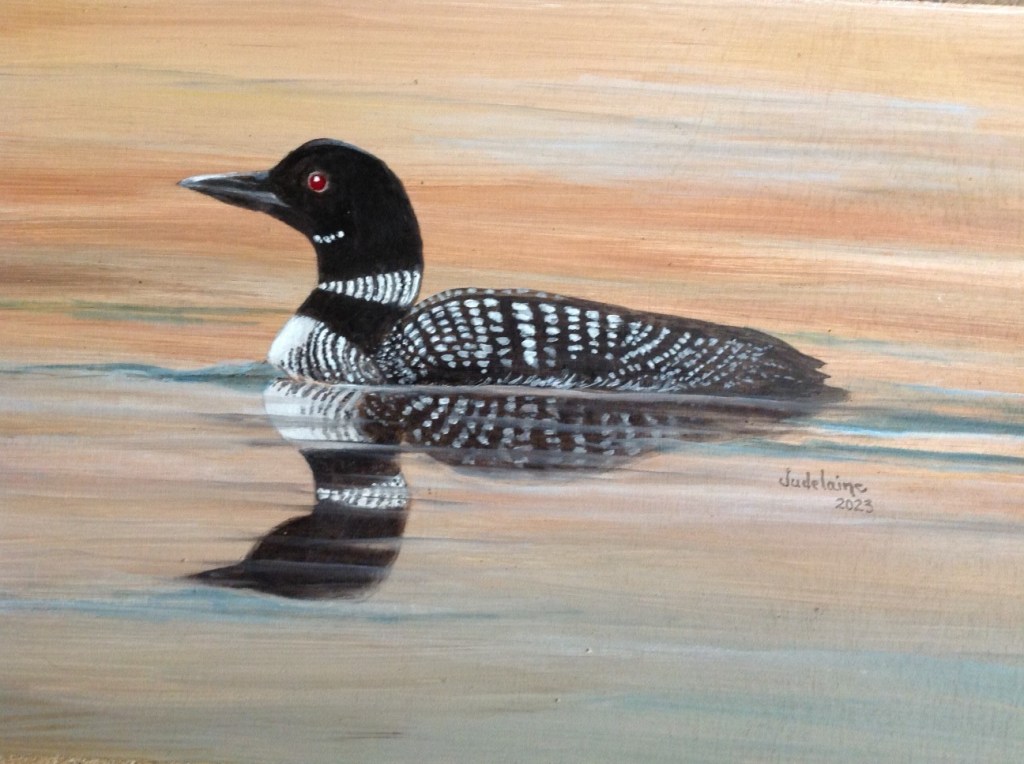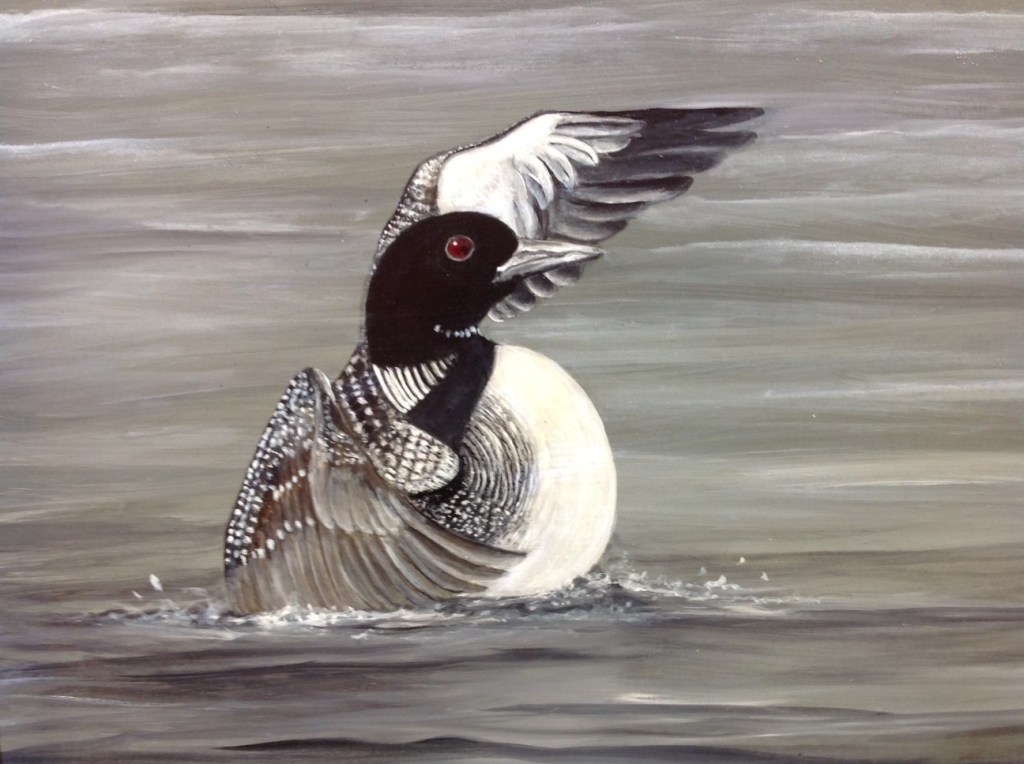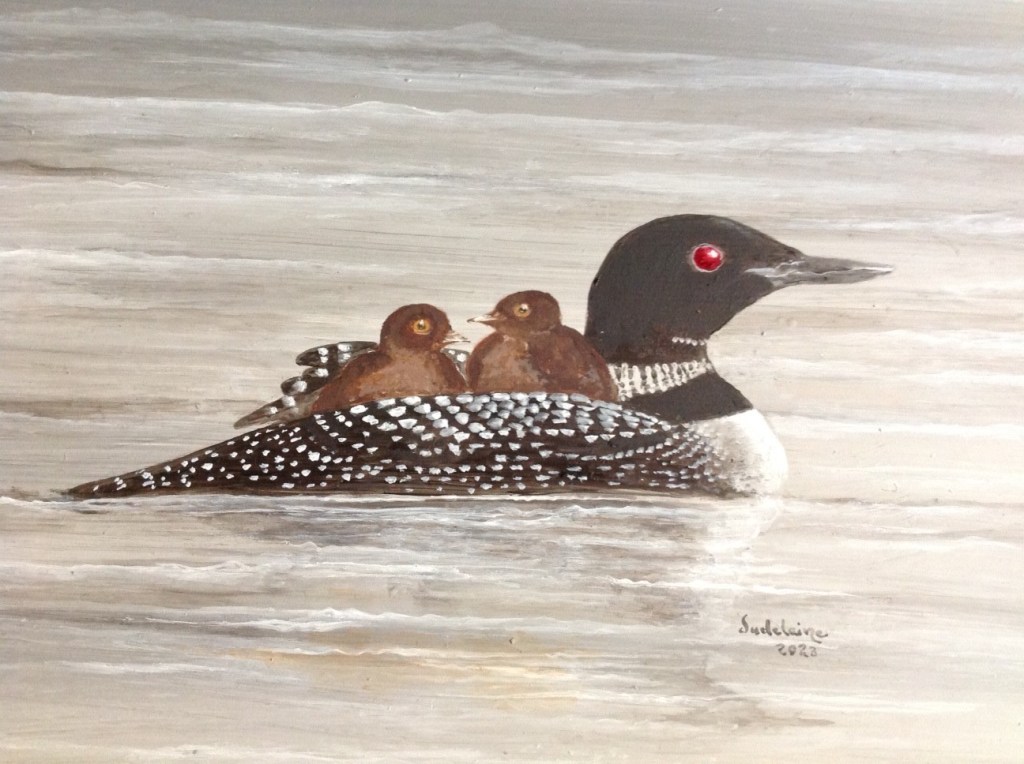THE FIRST WEEK of December, Papa came home for several days before having to haul a house trailer to Florida, and while he was home, he proposed cutting some of the spruce trees that were growing in a swampy area north of the pasture. “I can haul them to Illinois and sell them for Christmas trees. Ten trees, each ten dollars, an easy hundred,” he calculated, and while looking at me, he added, “You can ride on Joe and pull them home in a tarpaulin.”
“It’s mighty swampy down there,” I said. “Last summer Joe sunk in muck when we tried to explore that area.
“It’s winter now, and the swamp is frozen,” Papa replied.
So, on a sunny cold morning, Papa and Ted walked to the woods with Papa carrying hand axe and Ted carrying a Swede saw, a saw with a large toothed blade attached to a rounded metal arm. Shortly afterward, Joe and I followed, Joe wearing a harness and me carrying a canvas tarpaulin and tug lines, ropes that are fastened from the harness to the load being pulled.
Papa was right, the swamp was frozen and it didn’t take long for Joe and me to reach the spruce and tamarack thicket beyond the swamp edge. Grey and brown tamarack branches and trunks stood out against the green of spruce boughs. The tamaracks had lost their needles and looked dead, but I knew they weren’t. I broke off a twig and examined its bud scars. “New needles will poke through these little bundles in the spring,” I informed Joe. “It’s like magic.” He just kept plodding through the frozen swam moss.
Ahead, I could hear Papa and Ted talking. Then Papa started chopping. Shortly afterward, I watched as a spiraled spruce tree disappeared from where it had stood among other spiraled tree tops. When Joe and I reached the spot where it had stood, Papa had only cut the top off and was trimming branches. The topless tree lay half covered in snow. I looked around at all the spruce trees. They were all very tall, about the height of a telephone pole, and they all had beautifully shaped tops, perfect Christmas-tree-shaped tops. “Aren’t there any shorter ones?” I asked.
“No, the underbrush is too thick, they have to grow tall to get sunlight,” Papa explained. “There are plenty of them. We’ll cut just ten.”
“Make that eleven,” Ted called. “We need one too.” He was already sawing at the base of another tree with the Swede saw.
I slid from Joe’s back and helped Papa spread out the tarpaulin. “That’s one,” said Papa as he laid a nicely shaped Christmas tree on the tarp.
“Here comes another,” Ted announced as the tree he had been sawing toppled to the ground.
After cutting and trimming a third and a fourth tree, Papa said, “The snow is pretty deep. Four is about all Joe should drag out at one time. Take these home and when you return, we’ll have four more ready.” While saying this, he wrapped the tarpaulin around the trees and tied a rope snuggly around the load. He then fastened the tug lines from Joe’s harness to metal rings on the tarpaulin and boosted me onto Joe’s back. Then I headed for home. Earlier the sun had been shining, but now it was cloudy and light snow had started to fall.
While riding, I thought about the first time I had put the tugs on Joe. Papa had brought them home with a harness, another a gift from Mr. Altman. He told Papa that he thought Joe would make a good cart horse, and Joe did. During the summer, Ted and I made a cart out of an old lawnmower. After removing the mower blade and placing a wooden box over the engine, we fastened tugs to the handle and took turns sitting on the box while being pulled by Joe. We called it our lawn mower buggy. Ted and I also had Joe pull us on snow skis, alternating turns riding or being pulled. The one being pulled held onto the tug straps. Tugs, I thought to myself. That’s an appropriate name since they are used for tugging things.
When I arrived home, I untied the tarpaulin ropes and leaned the trees against the garden fence. Mama came from the house wearing a heavy sweater and stocking cap, and after looking at the trees said, “They’re shaped perfectly, and look, they have little pine cones on their top branches.”
“All the spruce trees are like that,” I replied and then added, “All the tops of the spruce trees, that is. Papa chopped down very tall scraggly trees just for their tops. He said they’re like that because of the thick underbrush, only the tops of the trees get sunlight.”
As we talked, I folded the tarpaulin and laid it and the tug straps over Joe’s withers before Mama boosted me onto his back.
“Wait,” she said. “I baked oatmeal cookies. You can take some with you. They’ll taste good about now.” She hurried into the house and returned with the cookies in a brown paper bag.
The wind had picked up and it was snowing more heavily when I turned Joe back onto the trail to the spruce swamp.
I could smell the cookies but didn’t take one. I didn’t want to risk having snow blow into the bag. I bent my head down and leaned over Joe’s withers to keep gusts of snow from blowing into my face.
When I reached Papa and Ted, they were standing with their backs to the wind. Ted turned and called, “What took you so long?”
“Oh, I went inside and read a book and Mama gave me a cup of hot chocolate and that made me tired so I took a nap,” I answered sarcastically.
And Ted sarcastically replied, “That’s what I thought.”
“We’re going to call it a day,” Papa interrupted. “We cut four more before the snow made it impossible to see the tree tops. We’ll wrap these in the tarpaulin and you and Joe can head for home.”
“Mama sent some oatmeal cookies,” I said while handing the bag to Ted. “Now you won’t starve if you get lost on the way.”
By the time the tree tops were snug in the tarpaulin and the tug lines fastened to Joe’s halter, the heavy snow had become a whiteout.
“I can’t see the trail!” I yelled to Papa.
“Just let Joe find the way!” he called back.
“Okay, Joe! Home! Let’s go home,” I shouted into the blowing snow. After entirely wrapping my face with my scarf, I leaned over Joe’s withers and rested my head on the side of his neck. Again, I shouted, “Home Joe! Home! You know the way!”
I could feel the tug straps pulling the tarpaulin. I could also feel the warmth of Joe’s back and thought about how much better it was to ride bareback in a blizzard. I also thought about Papa and Ted finding their way home. They’ll be okay, I told myself. Papa is a walking compass. He never gets lost.
When Joe eventually stopped, I sat up, uncovered my face, and looked around. We were standing at the pasture gate. “You did it, Joe. You did it,” I said softly.
After unfastening the tug lines and removing the halter, I walked Joe to the barn and put him in his stall. He nickered to Lovey while I brushed the snow from his coat. “Yes, tell her all about it, Joe,” I said while filling his hay rack with fresh hay. “Tell her how you found your way home all by yourself.”
At the back door, I kicked snow from my boots and used a boot jack to pull them off. When I stepped into the kitchen, I was greeted with warmth and the smell of fresh bread and vegetable soup. Papa and Ted were in the living room sitting close to the wood burning stove.
“Good to see you made it home,” Papa said. “We saw the tarpaulin and thought you were probably in the barn with Joe. Did he find the way on his own?”
“Yup. I wrapped my scarf around my head and leaned forward out of the wind. I had no idea where we were going. His body kept me warm too.”
Two days later, after loading the spruce trees into his truck, Papa told Mama, “I’ll be back in three weeks, expect me a week before Christmas.” Then he headed for Indiana where he planned to pick up a house trailer that he was scheduled to haul to Florida. While on the way, he also planned to stop and sell the trees to his Illinois buddies and their friends.
After Papa left, it continued to snow almost daily for two weeks and then it stopped. Gray skies changed to deep blue and the temperature dropped. It didn’t just drop, it crashed to 44 degrees below zero! We had been told that when it dropped near that temperature school buses wouldn’t start, and we were advised to listen for school closings on the local radio during such weather. Ted and I got up early on bitterly cold mornings to listen for these reports, and when it was announced that there would be no school, we jumped around laughing and clapping our hands. Ted was happy because he would be able to sleep in and read when he wasn’t sleeping. I was happy because I would be able spend a whole day with Joe.
Two weeks before Christmas, Ted and I convinced Mama that it was time to put up the tree, and when we went to town, she bought a tree stand and a box of tinsel. We had never needed a tree stand before because the only Christmas tree we ever had was a live one growing in a bucket. That was when we lived in Illinois. Illinois was corn country not spruce tree country, and Christmas trees were expensive. So, instead, we had bought a bucket tree. At Christmas time, a green towel was wrapped around the bucket and tiny baubles were hung on the tree. It was small, about a foot tall. But this year we had a real Christmas tree.
After securing our real Christmas tree in the stand and setting it in a corner of the living room as far from the wood burning heating stove as possible, we were faced with the challenge of decorating it. All that we had was the box of tinsel.
While we were carefully placing tinsel on the tree, Ted asked, “Do you smell cat pee?”
“I sniffed and replied, “Yeah. Maybe Bart sprayed it outside.” Bart was a stray tomcat that sprayed on things he thought were interesting.
“Well, there’s nothing we can do about it now,” Ted said, and I agreed. By the time we finished hanging the tinsel, the smell had disappeared or we had grown accustomed to it.
We didn’t have bobbles or lights, but we had paper and flour. We mixed the flour with water to make paste and cut the paper into short strips that we linked together into a long paper chain. We kept making links until the chain was long enough to wrap around the tree several times from top to bottom. We also cut symmetrical angels by folding three-inch squares in half and cutting out the shape of a half angel. When the paper was opened it became a full angel. Mama taught us how to do this, and her grandmother, Ted’s and my great-grandmother, had taught her. The three of us also cut six-sided snowflakes. We covered the tree with snowflakes and angels. At night they reflected the lamplight beautifully.
Several days after decorating the tree, Red Monzell, a grizzled old bachelor who sold firewood, stopped to ask Mama if we needed any.
“We’re okay for now, but stop back in a week when Charlie is home. He might want to get some more.” Mama said.
She invited Red into the kitchen for a cup of hot cholate, and he gladly accepted her offer.
“Would you like to see our Christmas tree?” I asked.
“Sure would,” he replied. Before going into the living room, Red looked at his boots. He had knocked most of the snow from them but a little remained.
“They’re okay,” Mama said. “The snow is clean.”
Red followed Ted and me into the living room and stood looking at the tree for a while before speaking, “Did you know that’s a swamp spruce?” he asked.
“Well, we got it from our swamp. Papa cut some to sell to friends in Illinois for Christmas trees,” I replied.
“How long ago did he cut them?”
“About three weeks ago. But we just put ours up yesterday.”
“Sorry to tell you this, but swamp spruce don’t make good Christmas trees. They look nice when they’re first cut, but their needles drop off and sometimes they smell skunky, like cat pee.”
Ted and I looked at each other and nodded.
“Some people call them cat spruce because of the smell,” he continued. “Your tree will hold its needles because you kept it outside in the cold, but expect them needles to start dropping in about a week.”
After Red left, Mama, Ted, and I talked about our cat-pee Christmas tree and wondered whether the trees Papa had taken to Illinois still had their needles and whether they also smelled like cat pee.
Five days before Christmas Papa had not returned home. We didn’t have a phone, so there was no way to contact him and learn the reason for his delay or find out when to expect him. Ted and I were concerned about gifts, receiving them and giving them. When we told Mama this, she said, “Well, I don’t have a lot of cash, but I can give you each five dollars to buy gifts.”
“That’s enough,” Ted and I agreed. “When can we go shopping?”
“How about tonight? Stores will stay open until nine, and you’ll do all of your shopping at Ben Franklin’s.” Ben Franklin’s was a department store that sold everything from nails to nylons.
Of course, Ted and I eagerly agreed.
Brightly colored Christmas lights and spruce boughs hung across Main Street, and the sidewalk was filled with shoppers. Mama parked on a side street and we quickly walked to the department store. Once inside, Ted and I headed straight for the items we had earlier discussed and decided upon, a pair of lumberjack socks for Papa and a potato masher for Mama. We pooled our money to buy these, and after equally dividing what was left, we went our separate ways to buy gifts for each other. I bought Ted a small single-blade pen knife and he bought me a 48-count box of Crayola crayons. With the little change we had left, we bought a box of candy canes to hang on the tree.
Two days before Christmas, Papa came home and that same afternoon, he
and Mama went into town to pay for the gifts that had been put on lay-away. Ted and I stayed home and wrapped our gifts with lunch bag paper that we flattened and decorated with crayon-drawn Christmas trees.
“I wonder if Papa knows whether the trees lost their needles,” I said.
“Yeah, me too,” Ted replied.
We didn’t have to wonder long. That evening Papa told us that a buddy contacted him and told him to stop and talk to his Christmas tree customers. “That’s why I was late getting home. I had to go to each home and return the money they had paid. Every tree had lost its needles, and some complained that the trees smelled like cat pee.” Then he added, “It was embarrassing.”
Ted and I told Papa about Red Monzell’s visit and what Red had said about swamp spruce losing their needles.
“They’re also known as cat spruce because they smell like cat pee. That’s what Red said,” Ted added.
“Hmmm,” Papa replied. “I guess we can chalk this up as a lesson. No more cutting swamp spruce for Christmas trees.”
